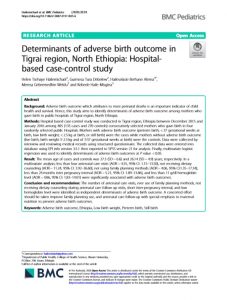
Background
Adverse birth outcome which attributes to most perinatal deaths is an important indicator of child health and survival. Hence, this study aims to identify determinants of adverse birth outcome among mothers who gave birth in public hospitals of Tigrai region, North Ethiopia.
Methods
Hospital based case-control study was conducted in Tigrai region, Ethiopia between December 2015 and January 2016 among 405 (135 cases and 270 controls) consecutively selected mothers who gave birth in four randomly selected public Hospitals. Mothers with adverse birth outcome (preterm birth; < 37 gestational weeks at birth, low birth weight; < 2.5 kg at birth, or still birth) were the cases while mothers without adverse birth outcome (live birth, birth weight ≥ 2.5 kg and of ≥37 gestational weeks at birth) were the controls. Data were collected by interview and reviewing medical records using structured questionnaire. The collected data were entered into database using EPI info version 3.5.1 then exported to SPSS version 21 for analysis. Finally, multivariate logistic regression was used to identify determinants of adverse birth outcomes at P value < 0.05.
Result
The mean age of cases and controls was 27.3 (SD = 6.6) and 26.14 (SD = 4.9) years, respectively. In a multivariate analysis; less than four antenatal care visits [AOR = 4.35, 95% CI: 1.15–13.50], not receiving dietary counseling [AOR = 11.24, 95% CI: 3.92–36.60], not using family planning methods [AOR = 4.06, 95% CI:1.35–17.34], less than 24 months inter pregnancy interval [AOR = 5.21, 95% CI: 1.89–13.86], and less than 11 g/dl hemoglobin level [AOR = 4.86, 95% CI: 1.83–14.01] were significantly associated with adverse birth outcomes.
Conclusion and recommendation
The number of antenatal care visits, ever use of family planning methods, not receiving dietary counseling during antenatal care follow up visits, short inter-pregnancy interval, and low hemoglobin level were identified as independent determinants of adverse birth outcome. A concerted effort should be taken improve family planning use, and antenatal care follow-up with special emphasis to maternal nutrition to prevent adverse birth outcomes.